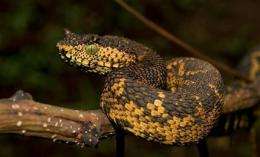New snake species announced

The Wildlife Conservation Society (WCS) announced the discovery of a spectacularly colored snake from a remote area of Tanzania in East Africa.
The striking black-and-yellow snake is called Matilda's horned viper. It measures 2.1 feet (60 centimeters) and has horn-like scales above its eyes.
The discovery is described in the December issue of Zootaxa. Authors of the study include: Michele Menegon of Museo delle Scienze of Trento, Italy; Tim Davenport of the Wildlife Conservation Society; and Kim Howell of the University of Dar es Salaam.
The authors are keeping the exact location of the new species a secret, since the snake could be of interest to the illegal pet collectors. Its habitat, estimated at only a few square miles is already severely degraded from logging and charcoal manufacture. The authors expect the species will be classified as critically endangered and have already established a small captive breeding colony.
The snake is named after the daughter of co-author Tim Davenport, Director of WCS's Tanzania Program.
More information: For more information about the snake, go to: http://www.atherismatildae.org/
Provided by Wildlife Conservation Society


















